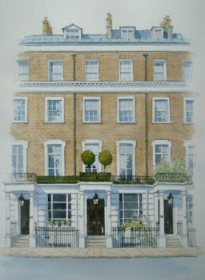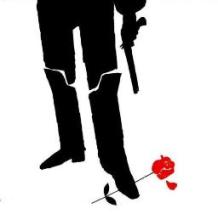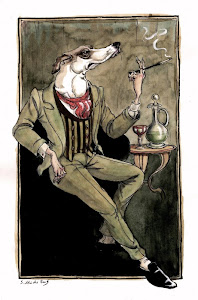 "A London dining-club is a curious organism, for it combines great tenacity of life with a chameleon-like tendency to change its colour. A club which begins as a haunt of roysterers may end as a blameless academic fraternity; another, which at the start is a meeting-place of the intelligent, becomes in the progress of time a select coterie of sportsmen. So it has been with the institution of which I am the chronicler. It has changed its name and is now the Thursday Club, and the number of permissible members has been increased. Its dinners are admirable; conversation at its board is dignified and a little serious; it has enlarged its interests, and would not now refuse a Lord Chancellor or a Bishop.
"A London dining-club is a curious organism, for it combines great tenacity of life with a chameleon-like tendency to change its colour. A club which begins as a haunt of roysterers may end as a blameless academic fraternity; another, which at the start is a meeting-place of the intelligent, becomes in the progress of time a select coterie of sportsmen. So it has been with the institution of which I am the chronicler. It has changed its name and is now the Thursday Club, and the number of permissible members has been increased. Its dinners are admirable; conversation at its board is dignified and a little serious; it has enlarged its interests, and would not now refuse a Lord Chancellor or a Bishop.But in its infancy it was different. Founded just after the close of the War by a few people who had been leading queer lives and wanted to keep together, it was a gathering of youngish men who met only for reminiscences and relaxation. It was officially limited to fifteen members--fifteen, because a dozen was dull, thirteen was unlucky, and fourteen had in those days an unpleasing flavour of President Wilson and his points. At first, until Burminster took it in hand, the food and wine were execrable; hence the name of the Runagates Club, given it by Lamancha from the verse in the 68th Psalm: "He letteth the runagates continue in scarceness."
But all defects in the fare were atoned for by the talk, which, like that of Praed's Vicar,
"slipped from politics to puns,
And passed from Mahomet to Moses."
You could never tell what topic would engage the company, and no topic was left unadorned, for I do not suppose there has ever been a group with such varied experiences and attainments. Each man was in his own way an expert, but, while knowledge might be specialised, the life of each had been preposterously varied. The War had flattened out grooves and set every man adventuring. So the lawyer and the financier were also soldiers; the Greek scholar had captained a Bedawin tribe; the traveller had dabbled in secret service; the journalist had commanded a battalion; the historian had been mate on a novel kind of tramp; the ornithologist had watched more perilous things than birds; the politician had handled a rougher humanity than an English electorate. Some of the members, like Lord Lamancha, Sir Edward Leithen and Sir Arthur Warcliff, were familiar to the public; others were known only to narrow circles; but at the Runagates Club they were of one family and totem, like old schoolfellows.
Good talk is not for reproduction in cold print. But at those early dinners there were reminiscences which may well be rescued from oblivion, for all were story-tellers on occasion. Indeed, it became the fashion once a month for a member to entertain the company with a more or less complete narrative. From these I have made a selection which I now set forth."
Preface to The Runagates Club, John Buchan (1928)





















2 comments:
Fascinating. Now I need to look for this.
You have taken the words out of my mouth Heavy TJ, I think I'll get a copy of this, too.
Post a Comment